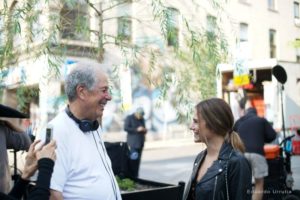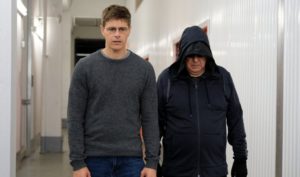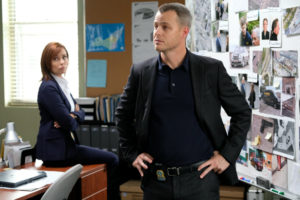The Fall of the American Empire
Denys Arcand takes the money and runs
By Jeff Goldsmith
In the opening of his latest film, The Fall of the American Empire (La chute de l’empire américain), French-Canadian writer-director Denys Arcand gives audiences exactly what they expect—an intelligent conversation between two emotionally torn people at a relationship crossroads—and then pulls the carpet out from underneath. Best known for his 2003 film The Barbarian Invasions (Les invasions barbares, which was nominated for a screenwriting Oscar), Arcand has so previously mastered the terrain of rocky midlife relationships it’s refreshing to see him delve into a bloodbath of a crime thriller based loosely on an actual armed robbery.
Immediately after Pierre-Paul Daoust (Alexandre Landry) breaks up with his longtime girlfriend, he finds himself witness to a robbery gone wrong and millions of dollars stuffed into a few duffle bags. Pierre-Paul, a delivery driver with a doctorate in philosophy, knows a good deal when he sees one, so he grabs the cash and does his best to hide it before the cops arrive. Our hero enjoys a celebratory session with a high-end escort, Aspasie (Maripier Morin), who winds up taking a liking to him after realizing he’s in over his head, then he recruits an ex-con with money-laundering skills, Sylvain “The Brain” Bigras (Rémy Girard) and the three try their best to evade both the police and the criminals looking for their loot. The result is an intelligent crime flick that shouldn’t be missed. During his recent press tour in New York, a team of crack publicists patched in Arcand for a phone interview with Backstory’s editor in chief about his previous films, his lost great work and, of course, The Fall of the American Empire.

Backstory: Before we get to the film at hand, I’d love to start with a favorite film—your 1989 Oscar nominee, Jesus of Montreal, which centers on a troupe performing a passion play that picks at some accepted precepts in theology.
Denys Arcand: Ah, great.
I’m curious, all these years later, what do you think the lessons were that have informed you as an artist? The film has really endured. I rewatched it within the past two years, and it held up just as strongly as when I first saw it.
Well, that’s a great compliment, because that’s always what you strive for as an artist or a filmmaker. You want to do stuff that will endure. My background was extreme Catholicism, in the sense that my mother before marrying my father was a nun and they both went to church all the time—it gave meaning to their lives. I was brought up like that and of course left all of it when I was 20. But still it’s a part of me. My childhood came back to me when I did that film and probably that’s what made it somewhat powerful or convincing.
I was trying to describe it to somebody recently, and I think one thing that’s interesting is the actors in the play undergo a religious experience as they’re performing it, which was really interesting considering some of the actors in the troupe started out in the film as nonbelievers or were not really too religious.
Exactly.
It was a unique character moment—which affected me, and I’m a Jewish fella.
Well, the thing you must remember first and foremost is that Jesus was a Jewish prophet.
Of course.
I keep telling people, Jesus was Jewish. He was not a Catholic. Catholicism came 200 years after his death, and it came about through the Roman Empire. So it had basically nothing to do with Jesus.
What do you remember as the toughest challenge of making Jesus of Montreal?
Let me think. No, I don’t remember anything being difficult. On the contrary, it was the easiest show I ever did. I remember we had a motto on the film. We were saying, “Jesus is with us—everything will be all right.” Of course, I had the incredible actor who played Jesus, Lothaire Bluteau, who’s almost a mystical person. He’s not your usual actor—he was living the part.

In The Fall of the American Empire, you are working with actor Rémy Girard, with whom you collaborated for years. I guess by now there’s a shorthand between you two.
Of course there is. I discovered Rémy in the theater years ago. I had written a sketch for a play that was composed of several sketches, and it was in Quebec City, far away from Montreal. Two months later, I show up at the opening night of this play and Rémy comes on the stage and he’s saying my lines and saying them better than I could have imagined these lines being said. It was absolutely unbelievable. I went to him afterward and said, “Listen, I’m going to write stuff for you—you’re going to be in my first film.” And at that time I’d never done a film. So it all goes back to that. But this is a guy who’s not at all an intellectual, who never asks me anything about the background of what I write, where I come from or where the inspiration comes from. He doesn’t care. He just looks at the lines, says the lines, and it’s perfect—so there you go.
He’s quite talented, and I love seeing you work together again. What brought you to the crime genre this time? This seems like an almost philosophical version of No Country for Old Men.
You’re right. I didn’t sit down and say, “Okay, I’m going to do a cops-and-robbers story or a film noir.” I just got interested in a story in Montreal that happened where two guys came into this fake fashion boutique and shot three people. They were settling accounts between two gangs in Montreal, but the event was so brutal, so brazen—it happened at noon on a very busy street—and Montreal is a rather peaceful city. So I was struck by that, and I knew the detective who was in charge, so I started talking to him, went with him on a few of his inquiries and so on. I got interested in the drug trade and the enormous amount of money that’s being made and the fact that these people end up with millions of dollars in small bills. And what do you do with that? They’re drowning in small bills—but that’s their problem. So from there I got interested in the money-laundering business, such as these high-flying lawyers and accountants who send money to the Virgin Islands, as you see in the film. Then the two stories meshed together. My first three films I did at the beginning of the ’70s were like that, so I almost went back to my roots, and it was fun.

Tell me about the title. I’m curious if there was any connection to your earlier (1986) The Decline of the American Empire? I was kind of looking for links between the two, but maybe I missed it.
Not really. To me, the meaning of that title is simply these times we live in, that’s all. My working title was Triumph of Money, then during editing I started doubting my title because some people had a mixed reaction, saying, “Oh, it’s about money—well, I’ve seen The Color of Money and Moneyball.” Or they couldn’t remember the title. They would say, “What’s it called, your thing about money? Is it Victory of Money or something like that?” And then I wasn’t sure about that title anymore. I said to myself, Well, I did this film called The Decline of the American Empire. Why not close the book and call it The Fall of the American Empire?
Tell me about your creative habits. How important is outlining when you sit down to write?
I don’t outline. I work in a strange fashion, which I wouldn’t recommend to anybody. I have an open file on my desk or in a drawer, and I start taking notes. These notes are random, or sometimes they’re not even notes but rather almost scenes or the beginning or ending of a scene or a clip about music or a location. And then the file keeps getting fatter and fatter. At some point, it becomes a big file, and then I feel that, okay, I have enough material to start really working. I try to put all these bits of papers and pictures and stuff like that [together] and find an order to it, and then I start writing.
When you get to that point, how long do you write per day? Do you give yourself a set time limit?
I start usually around 9:30 a.m. and write until 1or 1:30, and I’m done. And usually when I’m finished at 1 p.m., I’m drenched—literally, physically drenched. I go take a shower, and then that’s it for the day. I’m able to write for about four hours, not more than that.
How long did it take you to write Fall of American Empire?
I do a lot of versions, so I think the definitive version is my seventh one. It took about a year and a half, maybe.

I’m curious what you think of your protagonist, Pierre-Paul. He certainly thinks he’s the smartest guy out there after his pompous opening monologue, but the movie doesn’t exactly prove him to be the smartest guy, by any means.
Of course not.
How did you come up with that great opening where Pierre-Paul claims he’s simply too smart to be successful.
Ten years ago, I was at a very fancy dinner in Paris and somebody at the table was talking about the guy who was responsible for a very large bankruptcy and how he was still an intelligent man. Then this famous financier, one of the richest men in the universe, said, “You know what? In business, I don’t think intelligence is such an asset. I would even say that in most cases it’s a liability.”
That’s funny.
That sentence has stuck with me forever. I always thought, One day I’m going to open a movie with that, with someone who says, “I’m too intelligent for this world.” And it’s partly true, I’m sure. I’ll bet you know extremely bright people who are lonely living in a cabin in some mountain or living on the seashore or whatever, and they’re very bright but nobody will acknowledge it. They don’t go anywhere, they’re not successful in life—they’re just there, but they’re still a bright person. So that’s how it came about.
Endings are always important, and I like the end of this movie where Pierre-Paul helps out his homeless friend, who just dreamed of having an apartment. Tell me how you arrived at it and whether there were other endings you toyed with during the process of refining.
Well, the homeless people—the Inuit and Indian homeless people—were not written in the script. I happened to find them sleeping on the street one morning, and we shot them. Then I asked if they wanted to be extras, and so we did headshots and I didn’t know what to do with that. Later in editing, it became obvious we were going to end with their headshots. It was supposed to be a finish at the shelter, where Pierre-Paul ) was serving soup, but then [I remembered] the episode where gives encouragement to this homeless guy, his friend he had a beer with [earlier]. So when he gives him this apartment, the reaction of this actor was so good. It was so touching that we had to move it toward the end. When something is so good that what you were supposed to see after it becomes weaker, you just change the flow of the film and finish with it.
What was the toughest scene for you as both a writer and a director?
Hmmm, was there anything especially difficult? Well, I guess it’s not difficult to shoot, but it’s delicate—the love scene when [Aspasie] first shows up and does fellatio on [Pierre-Paul]. That’s delicate, and people are tense. The actors are tense. It’s not particularly difficult, but you gotta be careful because she was shy, he was shy. But that was about it. The rest was pretty easy.
Did your ending change regarding who would get away and who wouldn’t?
Well, the problem I had with the few people who read the script and the investors was that [Aspasie] was maybe not in love but was just attracted to this guy. I was pretty confident it could work, because I’ve met and known some high-end escorts and some of these girls are really nice. I thought she would be attracted to this guy because he’s very naïve but at the same time he’s generous. Some people had reservations and thought it would be unbelievable. I thought if I directed it well and cast the right people, it would be entirely believable—and I think I pulled it off.
Editing is like the last stage of storytelling. What did your story tell you in the editing room that maybe surprised you? Could be anything from a scene that was cut to something you wanted to go back and reshoot?
I don’t have budgets large enough to reshoot. Maybe like one scene or something like that, but I didn’t need to. The surprise, as I told you, was this guy being given an apartment and almost refusing it as he’s overwhelmed by emotion. That was the big surprise, and that’s why we moved it toward the end of the film.
What was your budget and schedule?
My budget was $7 million—which is like peanuts, you know? It’s a craft-service budget on a big Hollywood movie. We shot for 45 days.

Any artist during the length of their career winds up with projects that sometimes escapes them. Is there anything you ever went after years ago, a movie you really wanted to make, that you got away from you?
There was one. It’s a story that takes place in the early 1900s about pioneers who actually went and started farms in the depths of the Canadian forest. It’s a very dark, very complicated story by a French novelist who came to Canada in the 1900s. I really wanted to adapt that novel. I did the script with a playwright, and I believed in that script. I loved it, then at the last moment there was a big company who wanted to do the same story, and since it was an old novel, I couldn’t secure the rights because it was public domain. They did the film before I did mine, so I couldn’t do mine because the story was already burned. It was like what happened when they did Dangerous Liaisons [in 1988], and then the year after it, Milos Forman did Valmont. Their film was called Maria Chapdelaine [the 1983 adaptation of Louis Hémon’s 1913 novel, Maria Chapdelaine: A Tale of the Lake St. John Country]. It was done with bad actors, a bad director and so on. It really bombed. It was not a good film, but I couldn’t do mine because nobody would invest in a story that had been shot and distributed the year before. I could go back to it now, except I’m elsewhere now. The time has passed for me. So there’s a script of mine that’s never been done, but it happened only once.
I’d love to know what project you’re working on next?
Listen, I’m going to be 78 in June—I’m taking life quietly. But there’s a story I’m thinking of and taking notes on, and I have an open file again on my desk, so we’ll see.
It’s refreshing to hear Arcand still has an open file on his desk and we hope he continues working on it.
Stay tuned for more information about the possibility of Backstory publishing Arcand’s lost script for The Tale of the Lake St. John Country script, but we still need to get our hands on it and get it translated. In the meantime make sure to support The Fall of the American Empire in theaters—you’ll be glad you did.